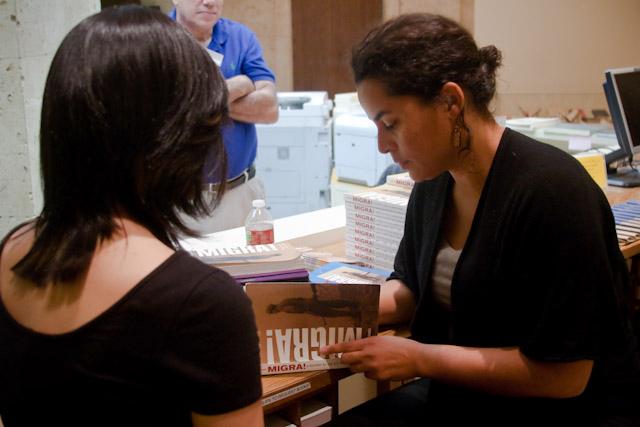
Historian and recipient of SMU’s William P. Clements Prize for the Best Non-Fiction Book on Southwestern America Kelly Lytle Hernandez signs copies of her book, “MIGRA! A History of the U.S. Border Patrol” after delivering a lecture Tuesday evening in the DeGolyer Library. (Spencer J Eggers/The Daily Campus)
Kelly Lytle Hernández, author of “Migra! A History of the U.S. Border Patrol” made her first visit to Dallas to receive the William P. Clements Prize for 2010’s best non-fiction book on Southwestern America.
Hernández received the award at the DeGolyer library where she also lectured on the evolution of the border patrol revealing why the topic of immigration is such a controversial one today.
Andrew Graybill, SMU professor and director of the William P. Clements Center for Southwest Studies introduced Hernandez and awarded her the William P. Clements Prize that honors the late Governor William P. Clements.
Graybill said of Hernández‘s work the book shows “[The] author’s tremendous prose style.”
Graybill congratulated Hernández on the honor and mentioned other authors who have won the prize in the past including Ned Blackhawk and William deBuys.
“Immigration is one of the most important issues of our time,” Hernández said as she took the podium in the dimly lit library. “For the past generation we have been a nation deeply divided by immigration.”
The author reviewed the history of the Border Patrol in the United States, stating it began during the Civil War when Southern slave holders had the plan to replace African slaves with Chinese immigrants.
When Northern congressmen found out about this, they passed the Anti-Coolie Act in 1862.
“By 1924 Congress had banned much of the world from legally entering the country,” Hernández said.
This started the major trend of immigrants entering the United States illegally.
To control the problem the U.S. Border Patrol was established that same year.
What began as a disorganized and unfocused group turned into a much larger and stronger force.
“The Border Patrol emerged as one of the most important institutions in American political and social life,” Hernández said,
According to Hernández, by the end of the 1920’s the Border Patrol decided to focus on Mexican immigrants.
The earliest officers used the job for economic survival and to gain influence in the community.
In the 1940’s the Border Patrol grew in numbers and influence because of WWII.
Soon the Border Patrol became “America’s first line of defense of crime,” said Hernández.
Today the issue of immigration is larger than it has even been and people are unsure about what side to take on the issue.
“States from Arizona to Alabama are locked in a gridlock about immigration control,” Hernández said. “Neither walls nor amnesty will resolve the crisis we confront.”
Following Hernández’s 40-minute lecture, the floor was opened to a question and answer session.
During the Q&A, Hernández revealed her views about the immigration issue.
“We are not criminals, we are humans,” she said. “We must take on the system to truly be able to find something called freedom.”








